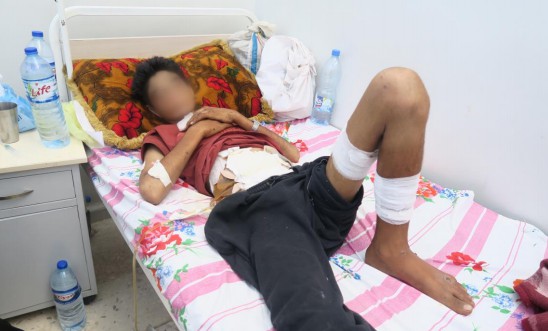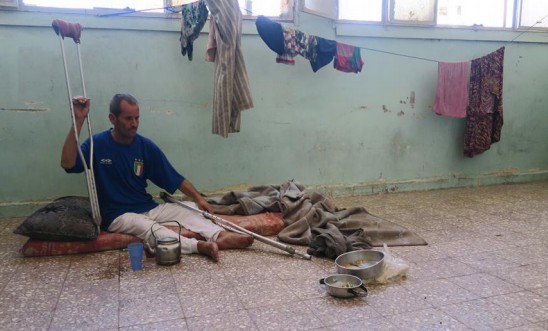Syria: Civilians trapped in deadly Raqqa labyrinth as fighting intensifies
'Whether you live or die depends on luck because you don’t know where the next shell will strike, so you don’t know where to run.'
Mohammed, resident of Raqqa’s Daraiya neighbourhood
As the battle for control over the Syrian city of Raqqa enters its final stage, the catastrophic toll on people trapped under fire in the region is rapidly intensifying.
Today we have released a new report documenting how hundreds of civilians have been killed and injured since an offensive began in June 2017 to recapture Raqqa, the ‘capital’ and main stronghold of the armed group calling itself Islamic State (IS).
Under fire from all sides
'All of a sudden, there were explosions all around, like fireworks. Then I fainted.'
Usama (pictured below), a 14-year-old boy, who sustained massive injuries during an air bombardment
Civilians have come under a barrage of ground and air attacks since the Syrian Democratic Forces (SDF) and the US-led coalition forces launched the final stage of the military operation in the city on 6 June 2017.

At the same time, IS forces have been using them as human shields and killing those attempting to escape areas under its control. Their conduct, notably that they embed themselves among the civilian population, poses a serious challenge for forces battling IS, and significantly increases the risk that civilians will be harmed.
Russia-backed Syrian government forces have also engaged in military operations to recapture areas south of the Euphrates river from IS by carrying out indiscriminate attacks which have killed and injured civilian residents.
Civilians are therefore trapped in the city, under fire from all sides as the fighting intensifies, putting their lives in grave risk.
‘I won’t forget this carnage’
'Don’t they keep watch over their targets before they bomb? If they had they would have known that there were only women and children there.'
'Aziz', relative of the victims of a series of coalition strikes northwest of Raqqa
Many residents who fled the city recently have described how unguided shots have been fired into the city’s residential neighbourhoods, targeting areas of hundreds of square metres rather than specific pinpoint targets. If true, this would count as disproportionate and indiscriminate attacks – an act that breaks international humanitarian law.
Residents of Raqqa explained the cost of these tactics to civilian life and the daily horrors they face. Hala, who lives in the al-Mansur neighbourhood of Raqqa, recounted how IS 'kept us like rats in a cage', blocking all the exits, while missiles and shells were 'falling on us from the sky.'

Ahmad, who was injured in a barrage of artillery shells in the Daraiya neighbourhood, west of the city centre, told us:
'The first shell landed right behind the house where I was... I fled across the road to the home of another relative but the next shell struck that house. The houses there are simple one-storey houses... they don’t offer much protection from such strikes.'
Ahmad went on to describe the deaths of several people on that single occasion, including many children as young as 18-months-old. He said:
'It all happened in the space of a few minutes... It was indescribable, it was like the end of the world – the noise, people screaming. If I live a 100 years I won’t forget this carnage.'
Use the slider below to see satellite imagery showing devastation in the city during June and July.
Danger to civilians set to increase
As the battle to recapture Raqqa reaches the city’s innermost areas, the danger to civilians looks set to increase. More can and must be done to save the lives of civilians trapped in the conflict.
While there is no doubt that those trapped in Raqqa face horrific brutality at the hands of IS, these violations do not lessen the international legal obligations of other warring parties to protect civilians.
The SDF and coalition forces must, among other measures, select only lawful targets and avoid indiscriminate or disproportionate strikes. They must take all possible precautions to minimise harm to civilians, and also create safe exit routes for them.
Innocent people cannot go on living in this deadly labyrinth any longer.
Read the report, “I won’t forget this carnage” – Civilians trapped in battle for Raqqa, in full now.